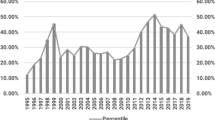Abstract
Not as much significant achievements as expected have been made since China launched its fight against corruption decades ago, though the Chinese Communist Party, as the initiator and promoter of the anti-corruption reform, made great efforts and changed several orientations of the combat. The article analyzes the implications of newly reorientation towards institutional building and argues that the CCP’s guideline for combating corruption has impeded its progress, no matter what means adopted. The further progress in corruption control depends on the change of political structure and social development in China.
Similar content being viewed by others
Notes
Melanie Manion, “Corruption and Corruption Control: More of the Same in 1996,” China Review, Issue 1997, pp. 33–56.
He Zengke, “Corruption and Anti-corruption in China’s Transitional Period,” from www.cccpe.com/text/50.html
Arnold Heidenheimer, Political Corruption: Readings on Comparative Analysis. New York: Holt Rinehart and Winston, 1970, pp. 26–7.
Gordon White, “Corruption and the Transition from Socialism in China,” Journal of Law and Society, March 1996, vol. 23, no. 1, p. 152.
People’s Daily, Beijing, January 25, 1996.
Jiang Zeming, On Party’s Construction, Central Document Publishing House, Beijing, 2001, 361.
People’s Daily, Beijing, January 6, 2006.
Deng Xiaoping, Selective Works of Deng Xiaoping, People’s Publishing House, Beijing, 1983, pp. 320–331.
Melanie Mansion, “Corruption and Corruption Control: More of the Same in 1996,” China Review, Issue 1997, pp. 33–56.
Cai Xiao, “Anti- Corruption: Four Great Issues and Three Key Links,” Liaowang Newsweekly, Beijing, January 2, 2006.
Shao Daosheng, “Anti-corruption in Chinese Society since the Party’s 16th Congress,” from http://www.jcrb.com/zywfiles/ca528874.htm
ibid.
Wu Guanzheng, “the Report of Central Discipline Committee in the Party’s 16th Congress.” Xinhua Monthly, no.12, 2002, p. 40.
Yiming, “Result of Anti-Corruption in 2004: 16 High Officials Were Punished,” from http://www.chinaclue.com/titm/2005.3.7/
Wu Guanzheng, “Report of 5th Plenary Session of the Central Discipline Inspection Committee,” Xinhua Monthly, Beijing, No. 2, p.20; and Jia Chunwang, “Report of Supreme Procuratorate in 2005,” Xinhua Monthly, no. 4, 2005, p. 66.
Lin Hanchuan, Xue Kai, “Characteristic of Corruption in 2004,” Clean Government Outlook, Harbin, Hei Longjiang, no. 1, 2005.
Jia Chunwang, “Report of Supreme Procuratorate in 2004, 2005, 2006,” Xinhua Monthly, no. 4, 2004, p.73; no. 4, 2005, p.62; no. 4, 2006, pp. 68–69.
Dong Changzheng, “A Brave Fighter of Anti-Corruption,” from http://news.china.com/zh-cn/domestic/945/20061212/13804402.html
China News Net 2006, 1, 7, from http://www.sina.com.cn
Gordon White, “Corruption and the Transition from Socialism in China,” Journal of Law and Society, 1996, vol.23, no.1, p. 150.
ibid., pp. 157–161.
Dong Changzheng, “A Brave Fighter of Anti Corruption.” http://news.china.com/zh-cn/domestic/945/20061212/13804402.html
He Zengke, “Corruption and anti-corruption in Chinese Transitional Period,” from www.cccpe.com/text/50.html
Chen Zewei, “New Development of China’s Strategy of Anti-Corruption: From Policy to Law,” from http://news.hexun.com/detail.aspx?id=1474749
Xiang Ling, “The Fundamental Problem of Anti-corruption is Reform of System,” from http://news.easday.com/eastday/node127047/node127047/ula2270764.html
C. Simon Fan, Herschel I. Grossman, “Simulation and Corruption in the Reform of Chinese Economic System,” China: Challenging Corruption, Hangzhou: Zhejiang People’s Publishing House, 2001, pp. 149–163.
“Do you agree that Mo Miaorong come back to lead us in building Xiaoshan again if we pay higher salary to him?” from http://club.xsnet.cn/dispbbs.asp?boardid
C. Simon Fan, Herschel I. Grossman, “Simulation and Corruption in the Reform of Chinese Economic System,” China: Challenging Corruption, Hangzhou: Zhejiang People’s Publishing House, 2001, pp. 149–163.
Gordon White, “Corruption and the Transition from Socialism in China,” Journal of Law and Society, March 1996, vol. 23, no. 1, p. 162.
“The implementation outline of building up anti-corruption system based on combination of education, institution, and supervision,” on the website of the Supervision Ministry of the People’s Republic of China, from http://www.mos.gov.cn/template/article/display0.jsp?mid=20060302021322
Zhan Hongwu, “Should Review of Report on Duty by government officials be written into Supervision Law?” National People’s News Net, April 4, 2003, from http://zgrdxw.peopledaily.com.cn/gb/paper8/24/
ibid.
People’s Daily, Beijing, August 30, 2006.
People’s Daily, Beijing, January, 6, 2006.
Shao Daosheng, “Result of China’s Anti-Corruption in 2006,” from http://guancha.gmw.cn/show.aspx?id=1634
ibid.
“The Central Authority Controls Secretary of Discipline Inspection Committee at provincial Level in order to Control Anti-Corruption,” Wenhui Daily, Hong Kong, December 6, 2006.
Jiefang Daily, Shanghai, January, 10, 2007.
Melanie Manion, “Corruption and Corruption Control: More of the Same in 1996,”China Review, Issue 1997, pp. 33–56.
He Zengke, “Corruption and Anti-corruption in China’s Transitional Period,” from http://www.cccpe.com/text/50.html
People’s Daily, Beijing, December 25, 2006.
Shao Daosheng, “Anti-corruption in Chinese Society Since the Party’s 16th Congress,” from http://www.jcrb.com/zywfiles/ca528874.htm
Gordon White, “Corruption and the Transition from Socialism in China,” Journal of Law and Society, March 1996, vol. 23, no.1, p. 152.
Author information
Authors and Affiliations
Corresponding author
Rights and permissions
About this article
Cite this article
Zhu, Q. Reorientation and prospect of China’s combat against corruption. Crime Law Soc Change 49, 81–95 (2008). https://doi.org/10.1007/s10611-007-9099-8
Accepted:
Published:
Issue Date:
DOI: https://doi.org/10.1007/s10611-007-9099-8




